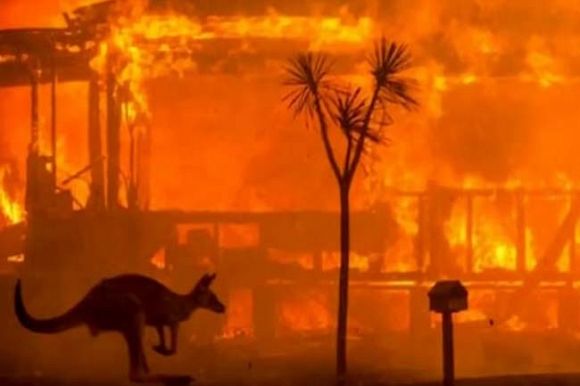PLAN E, a new climate and environmentally centred security strategy, finds world’s security forces must pivot, writes Dr Elizabeth Boulton.
PRUSSIAN GENERAL Carl von Clausewitz is famous for teaching the fundamentals of war. He emphasises that war is a political act, it serves politics, ideally the populace.
What if Clausewitzian theory was applied to what is often described as “the greatest threat” — the spectra of global warming and ecological collapse? What if the populace decided that the climate and ecological crisis was the highest priority threat and directed security strategy to re-orient accordingly?
This was the question I explored in my PhD research. The result, PLAN E, a new climate and environmentally centred security strategy, was published by the U.S. Marine Corps University Press last month. It is presented in two parts. There is PLAN E and then, within the 2022 Spring Journal of Advanced Military Studies, which examines the role of militaries in disasters, there is a theoretical argument as to why humanity needs a new plan.
The most shocking insight to fall out of the analysis was the realisation that humanity's vast security sector – its intelligence agencies, foreign affairs strategists, the plethora of think tanks, university departments and finally, its militaries who are often subject to carry out the aforementioned groups' plans – were in fact, often, inadvertently working for the hyperthreat.
Our security agencies were now working for our enemy. Not consciously, of course, but because their conceptual gear settings had not changed from those of the 20th Century. To explain this baffling idea, let us go back in history.
Once upon a time, fossil fuels were good. They were regarded as essential for military victory, the security and flourishing of the state. This became apparent in World War I when militaries first began using tanks and aircraft, at scale, supported by truck and rail-based supply chains.
By World War II, as Robert Goralski and Russell Freeburg document, the link between oil and victory became indisputable. For example, the Allies’ ability to deny Rommel access to Middle Eastern oil fields in 1942 was considered one of the major turning points of the war.
Accordingly, war strategy making routinely saw military tactics entwined with the concurrent task of securing resources and protecting supply chains. This continued and became a given in subsequent conflicts, like the Gulf War in 1990. Oil has come to be associated with military victory and state security.
Likewise, once coal was good. As Sonya Duus found in her research, humans’ cultural and economic bonds to coal go way back; it provided warmth, employment and trains. In Australia, it swelled our GDP. It helped make us content, safe and secure. In England, coal infused literature, culture, history and politics.
Historian Edward Hunt notes that:
“...virtually all the early working-class members of Parliament were coal miners, so in some way, there was a sense that it was coal miners who opened up the political system.”
At some level, we loved coal. Along with Billy Elliot, it was part of our history.
In general, after World War II, resource extraction was good. It provided the Western world with “material security” — that is, all the food, timber, steel, fibre, minerals and so on that assist human societies and the nation-state to function at a practical level. Pursuing resources was understood as an ethical undertaking — part of the post-war rebuild and resources for freedom narratives.
In the 1970s, due to a combination of oil shocks and limits to growth discourse, material security started to have greater ramifications for international relations and security policy.
A generic term to describe the security sector’s role in material security is Doug Stokes’ systems maintenance construct. Stokes explains that as global supply chains became more vulnerable to disruptions, there was an increased global commons argument to use tools of force, like the Central Intelligence Agency (CIA) and the U.S. military to maintain the system.
Thus, under “systems maintenance” logic, the role of security forces in protecting resource extraction activities and their supply chains has historically been regarded as a necessary and dutiful service to the nation.
The problem is, due to 30 years of Intergovernmental Panel on Climate Change (IPCC) reports, we now know that this situation has been turned upside down. The “system” that our foreign affairs and security folk often support now threatens all forms of planetary life, including homo sapiens. Thus, what once made us – the West – secure, victorious, powerful and safe, now does the opposite.
Further, because the “material security” mission has been pursued so brutally, (consider Timor Leste bugging or New Confessions of an Economic Hitman), the West is increasingly being viewed as “the threat” by the rest of the world.
This sentiment was recently expressed by Indian TV anchor Rahul Shivshankar in an infamous video:
“Don’t lecture us here in India, okay? You people and your Colonial agenda has wrecked the South, wrecked the East and don’t sit there and lecture us.”
PLAN E offers an alternative: our “security” sector abruptly turns its attention and “systems maintenance” support away from the fossil fuel and extractive resource sector and back to its own people. It supports a different “systems maintenance” mission: the protection of our planetary life system.
Dr Elizabeth Boulton has worked in emergency logistics (as an Australian Army Officer and with NGOs) and in the climate science and policy sector. She is now an independent researcher with Destination Safe Earth.
Related Articles
- War is not the biggest threat to Australia's security
- 'Don't Look Up' Election further ignores climate crisis
- Climate crisis worsened by population and economic growth
- Regenerative agriculture can save the planet and humankind
- UN warns Australia in danger of increased wildfires
 This work is licensed under a Creative Commons Attribution-NonCommercial-NoDerivs 3.0 Australia License
This work is licensed under a Creative Commons Attribution-NonCommercial-NoDerivs 3.0 Australia License
Support independent journalism Subscribe to IA.













